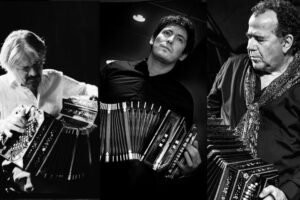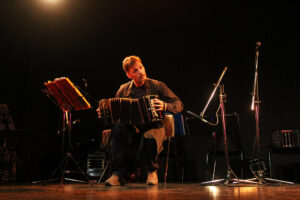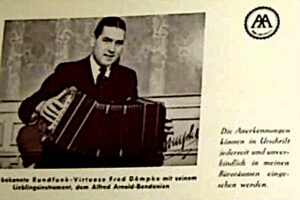
Bandoneón Tutorial: The Inicial 1
In this bandoneón tutorial I explain the first of a series of preparatory exercises. After having dedicated a series of videos to the fundamental aspects
2024 is coming to an end and I have been very busy during this year preparing for a Conservatory exam and a series of concerts here in Buenos Aires. During this time, the themes of public performance and stage panic have been central to my experience, and I’d like to share some personal reflections with you.
It all began on October 31st, when I performed at a gathering of bandoneon players at La Tierra Invisible, an artistic space run by my bandoneon teacher, Julio Coviello. For the occasion, I chose two pieces that I believed I could play flawlessly—or so I thought.

I felt calm until my turn arrived, midway through the evening. Then, out of nowhere, my heart started racing. I tried to steady myself, but it may have only heightened my agitation. On stage, my hands were trembling and refused to obey. Just hours earlier, I had played the same piece perfectly in front of my teacher, but at that moment, it felt as though I was confronting it for the first time.
I somehow made it through the first piece and moved on to the second, which I managed to play cleanly from start to finish.
The following day, I reflected on the experience. Beyond the emotional factor, I wondered, why had the second piece gone better than the first?
Here’s what I realized:
This led me to an important insight: focusing on the expressive aspects of a piece helps the nervous system stay oriented around its larger musical structure, providing greater confidence during performance. Conversely, focusing solely on the notes risks losing the broader perspective.
I put this theory to the test less than a month later, on November 21st, during a concert celebrating the 40th anniversary of Centro Cultural Rojas. Performing with the bandoneon ensemble led by Maestro Néstor Marconi, I had the chance to play as a soloist. I chose a demanding piece: a bandoneon arrangement of Chant Donné by Maurice Duruflé, a four-voice polyphonic work that requires intense focus.
This time, I prepared differently:

On the day of the concert, I prepared mentally by recalling a positive and motivating memory: the time I approached a challenging university exam in Mathematical Analysis with determination and passed it brilliantly.
Before stepping on stage, I repeated to myself: Stay calm, focus on expression. Think of the Math exam. On stage, I took my time adjusting the bandoneon and centering my focus.
I mentally decided the tempo of the score, took a deep breath, and began to play.
That night was magical, and a special person captured the moment. I’m delighted to share this memory with you.
I’d like to end with two phrases that have deeply inspired me:
Thank you for reading to the end. I hope these reflections are helpful to you.

In this bandoneón tutorial I explain the first of a series of preparatory exercises. After having dedicated a series of videos to the fundamental aspects

Learn about chromatic bandoneons! Download FREE PDF keyboard layouts for Peguri, Manoury, & Crosio-Caliero systems. Unisonoric bandoneon explained for beginners.

A Lesson from the Bandoneon to Move from Stage Panic to Expressiveness 2024 is coming to an end and I have been very busy during

Who is Fred Dömpke and why should deserve more consideration among the bandoneon players? The bandoneon is conquering a significant role in jazz. Many bandoneon

The Bandoneon Price depends on the type of Bandoneon you want to buy. The equation is simple: if you want to learn to play the

Discussing Bandoneon Making with Baltazar Estol A few years ago I saw a video by M. Rodolfo Daluisio playing a bandoneon built by Baltazar Estol.